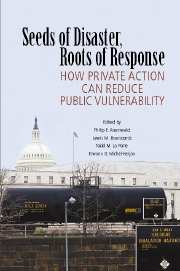Book contents
- Frontmatter
- Contents
- List of Contributors
- Foreword, by General Robert T. Marsh
- Preface
- Acknowledgments
- I SEEDS OF DISASTER
- 1 Where Private Efficiency Meets Public Vulnerability: The Critical Infrastructure Challenge
- II A CRITICAL CHALLENGE
- III MANAGING ORGANIZATIONS
- IV SECURING NETWORKS
- V CREATING MARKETS
- VI BUILDING TRUST
- VII ROOTS OF RESPONSE
- References
- Contributors
- Author Index
- Subject Index
1 - Where Private Efficiency Meets Public Vulnerability: The Critical Infrastructure Challenge
Published online by Cambridge University Press: 30 July 2009
- Frontmatter
- Contents
- List of Contributors
- Foreword, by General Robert T. Marsh
- Preface
- Acknowledgments
- I SEEDS OF DISASTER
- 1 Where Private Efficiency Meets Public Vulnerability: The Critical Infrastructure Challenge
- II A CRITICAL CHALLENGE
- III MANAGING ORGANIZATIONS
- IV SECURING NETWORKS
- V CREATING MARKETS
- VI BUILDING TRUST
- VII ROOTS OF RESPONSE
- References
- Contributors
- Author Index
- Subject Index
Summary
2001: September 11 attacks. The theoretical vulnerability of the United States to a major terrorist strike is suddenly a stark reality. Impacts are global and enduring.
2003: U.S.–Canada blackout. A massive failure of the electric power distribution system demonstrates how human error can jeopardize vital public services.
2004: Indian Ocean tsunami. A deadly wave travels through Southeast Asian waters more quickly than potentially life-saving warnings through airwaves. Nearly 300,000 lose their lives.
2005: Hurricane Katrina. Four years after the 9/11 attacks, a violent but long-anticipated hurricane overwhelms a vulnerable coastline, meets an unprepared government, and inflicts lasting damage on a population. A superpower fails to meet the most basic needs of its citizens in crisis.
Are these recent disasters related? Will coming years bring ones even more severe? Is our modern, highly interconnected, global economy creating new types of vulnerabilities and worsening old ones? Who can act to reduce these vulnerabilities – in particular, to prevent terrorist attacks and natural disasters from having catastrophic consequences? More to the point, who will act?
This book contributes to the current and long-overdue debate on these questions. A series of important recent reports and studies sound the alarm on the inadequate preparedness of government at all levels to cope with the new generation of challenges evidenced by the crises listed above; the reports of the 9/11 Commission and of the congressional committee investigating the government's actions during and shortly after Hurricane Katrina are particularly notable.
Information
- Type
- Chapter
- Information
- Seeds of Disaster, Roots of ResponseHow Private Action Can Reduce Public Vulnerability, pp. 3 - 16Publisher: Cambridge University PressPrint publication year: 2006
Accessibility standard: Unknown
Why this information is here
This section outlines the accessibility features of this content - including support for screen readers, full keyboard navigation and high-contrast display options. This may not be relevant for you.Accessibility Information
- 4
- Cited by
